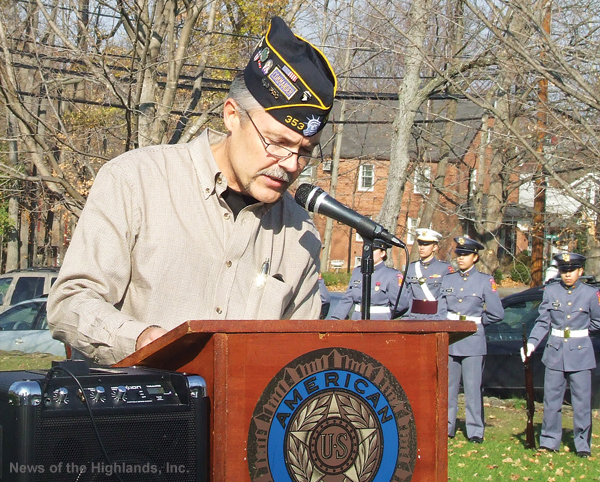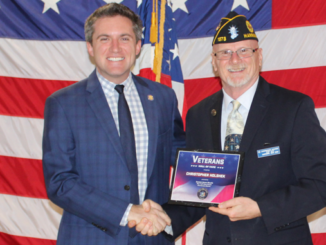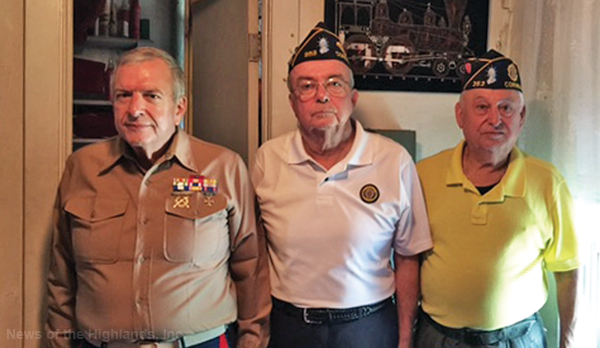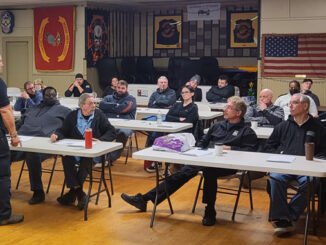
Most kids have no idea of what they want to do when they finish school. Peter Kurpeawski knew from the beginning.
He enlisted in the military when he was 18, and served for more than 20 years. Now he’s the commander of American Legion Post 353. And on Veterans Day, he’ll speak to the community. He’s been working on his message for almost a month.
The commander’s family had a history of service. His mother’s father, a British subject, fought in five different wars. He was a motorcycle messenger in World War I and a fighter pilot in World War II. He was eventually knighted for his sacrifice and bravery.
The commander’s father saw action in China and Burma during the Second World War. He only talked about his experience when certain movies appeared on television – films like “Merrill’s Marauders” or “The Long Road to Burma.” Then he would turn to his family and share one brief observation. “I was there,” he would say.
When Peter Kurpeawski’s turn came he didn’t hesitate. Looking back on his enlistment, the commander was philosophical. “Everyone for the most part has some kind of calling when they join the military,” he said. “I believed in America.”
He served as a military policeman in several countries on two continents. When his 20 years were up, he retired as a master sergeant and was planning to become a civil engineer. Then the world changed on Sept. 11, 2001. “How am I going to walk away,” he asked himself, “when the need is here?”
Msgt. Kurpeawski stayed with his reserve unit and completed two tours in Iraq. He was there in 2003 and 2004. “It was completely different from peacetime,” he admitted. “But if you stick with Army values and ethics, you’ll make wise decisions.”
The military police were attached to several different outfits. (The initials “M.P.” could stand for “multi-purpose” as well as “military police.”) Msgt. Kurpeawski was part of the 1st Marine Division before serving under Gen. Petraeus in the 101st Airborne. He and the other MPs were outside the wire (away from the safety of the base) every day.
But that’s not what he’ll talk about on Nov. 11. He’s likely to mention the difficult transition for combat soldiers who return home. “You become a different person,” he said during an October interview. “Most get divorced. The stress of making decisions makes you stronger. But you feel detached. You only identify with service members who’ve been to war.”
While Mr. Kurpeawski was overseas, John Hussey and Tom Quinlan of the American Legion approached his family to ask how they could help. The master sergeant was overwhelmed. He became interested in the legion, and joined when he returned home. “It’s a good organization,” he says today. “It’s vets taking care of vets.”
About a year-and-a-half ago, several members persuaded him to become the commander. If he had any misgivings, he’s now glad that he accepted the position. “It’s one of the most rewarding jobs,” he said during the interview. “It gives me the ability to talk about topics that people need to hear.”
A year ago, he spoke of the hardships that many veterans encounter when they leave the combat zone. “Part of the sacrifice,” he said, “is coming home and being unemployed or underemployed.”
He reported that veterans make up one-fourth of the homeless population in the United States. But they still maintain their sense of responsibility. As a group, they’re more likely to vote than the average citizen.
Last Memorial Day, the commander paid tribute to the young soldiers who have lost their lives. “Some of them are teenagers,” he said. “Most are under 25. To remember them just once a year is not enough.”
As he prepared for this year’s speech, the commander had still another concern. “We’re losing more to suicide,” he said, “than to the enemy. We’re here to offer our help.”
When he says “we,” he means the American Legion. And “helping vets” is a strong calling, like the one that prompted him to enlist.



